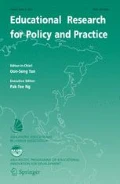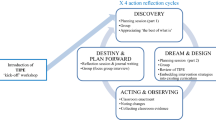Abstract
This article considers the role of trust in teacher professional learning as a form of policy enactment. Drawing upon an experienced teacher’s understandings of an assessment policy, Growing Success, in Ontario, Canada, we foreground the sociality of trust and how trust is an essential ingredient for teacher learning as policy enactment. Using a narrative methodology, we investigate how this teacher engaged in two parallel professional learning opportunities, centered on the same policy. These opportunities fostered very different, conflicting perceptions of the policy. In this way, our work indicates how a single policy may be interpreted as more or less ‘disciplinary’ or ‘developmental,’ depending on the relations of trust that are ascribed to it through the professional learning opportunities that attend its enactment. Based on our analysis of the data, we conclude that professional learning contexts need to be ‘trust-rich’ if they are to serve as a vehicle for meaningful policy enactment.
Similar content being viewed by others
References
Anderson, S., & Ben Jaafar, S. (2003). Policy trends in Ontario education 1990–2003. Toronto: Ontario Institute for Studies in Education, University of Toronto.
Author. (2013).
Author. (2014).
Ball, S., Maguire, M., & Braun, A. (2012). How schools do policy: Policy enactments in secondary schools. London: Routledge.
Ball, S., Maguire, M., Braun, A., & Hoskins, K. (2011a). Policy subjects and policy actors in schools: Some necessary but insufficient analyses. Discourse: Studies in the Cultural Politics of Education,32(4), 611–624.
Ball, S., Maguire, M., Braun, A., & Hoskins, K. (2011b). Policy actors: Doing policy work in schools. Discourse Studies in the Cultural Politics of Education,32(4), 625–639.
Bamberg, M. (1997). Positioning between structure and performance. Journal of Narrative and Life History,7, 335–342.
Braun, A., Maguire, M., & Ball, S. J. (2010). Policy enactments in the UK secondary school: Examining policy, practice and school positioning. Journal of Education Policy,25(4), 547–560.
Bryman, A. (2012). Social research methods (4th ed.). Oxford: Oxford University Press.
Campbell, C., & Fullan, M. (2006). Unlocking potential for learning effective district-wide strategies to raise student achievement in literacy and numeracy. Toronto, ON: The Literacy and Numeracy Secretariat.
Campbell, C., Lieberman, A., & Yashkina, A. (2016). Developing professional capital in policy and practice: Ontario’s Teacher Learning and Leadership Program. Journal of Professional Capital and Community,1(3), 209–236.
Cerna, L. (2014). Trust: What it is and why it matters for governance and education. OECD education working papers, 108. Paris: Organization for Economic Cooperation and Development Publishing. http://dx.doi.org/10.1787/5jxswcg0t6wl-en.
Chen, P., Lee, C.-D., Lin, H., & Zhang, C.-X. (2016). Factors that develop effective professional learning communities in Taiwan. Asia Pacific Journal of Education,36(2), 248–265.
Coburn, C., & Stein, M. K. (2006). Communities of practice theory and the role of teacher professional community in policy implementation. In M. Honig (Ed.), New directions in education policy implementation: Confronting complexity (pp. 25–46). Albany, NY: State University of New York Press.
Connelly, F. M., & Clandinin, D. J. (Eds.). (1999). Shaping a professional identity. New York: Teachers College Press.
Daniel, Y., & Bondy, K. (2008). Safe schools and zero tolerance: Policy, program and practice in Ontario. Canadian Journal of Educational Administration and Policy,70, 1–20.
Evetts, J. (2009). New professionalism and new public management: Changes, continuities and consequences. Comparative Sociology,8(2), 247–266.
Fukuyama, F. (1995). Trust: The social virtues and the creation of prosperity. New York: Free Press.
Goddard, R. D., Salloum, S. J., & Berebitsky, D. (2009). Trust as a mediator of the relationships between poverty, racial composition, and academic achievement: Evidence from Michigan’s 209 public elementary schools. Educational Administration Quarterly,45(2), 292–311.
Hargreaves, A. (2007). Sustainable professional learning communities. In L. Stoll & K. Louis (Eds.), Professional learning communities: Divergence, depth and dilemmas (pp. 181–195). London: Open University Press.
Hoy, W. K., & Tschannen-Moran, M. (1999). The five faces of trust: An empirical confirmation in urban elementary schools. Journal of School Leadership,9, 184–208.
Huffman, J. B., Olivier, D. F., Wang, T., Chen, P., Hairon, S., & Pang, N. (2016). Global conceptualization of the professional learning process: Transitioning from country perspectives to international commonalities. International Journal of Leadership in Education,19(30), 327–351.
Jackson, A., & Mazzei, L. (2017). Thinking with theory: A new analytic for qualitative inquiry. In N. Denzin & Y. Lincoln (Eds.), The Sage handbook of qualitative inquiry (5th ed., pp. 717–737). Los Angeles: Sage.
Lee, J. C., Zhang, Z., & Yin, H. (2011). A multilevel analysis of the impact of a professional learning community, faculty trust in colleagues and collective efficacy on teacher commitment to students. Teaching and Teacher Education,27(5), 820–830.
Louis, K. S. (2006). Changing the culture of schools: Professional community, organizational learning, and trust. Journal of School Leadership,16, 477–489.
Louis, K. S., & Murphy, J. (2017). Trust, caring and organizational learning: The leader’s role. Journal of Educational Administration,55(1), 103–126.
O’Neill, O. (2013). Intelligent accountability in education. Oxford Review of Education,39(1), 4–16.
O’Neill, O. (2017). Intelligent trust in a digital world. New Perspectives Quarterly,34(4), 27–31.
Ontario Ministry of Education. (2003). Student success/learning to 18: The student success strategy. Retrieved May 29, 2013 from http://www.edu.gov.on.ca/eng/teachers/studentsuccess/strategy.html.
Ontario Ministry of Education. (2010). Growing success: Assessment, evaluation and reporting in Ontario schools. Toronto, ON: Queen’s Printer for Ontario.
Ozga, J., & Lingard, B. (2007). Globalisation, education policy and politics. In B. Lingard & J. Ozga (Eds.), The RoutledgeFalmer reader in education policy and politics (pp. 65–82). London: Routledge.
Patton, M. Q. (2002). Qualitative research and evaluation methods. London: SAGE Publications.
Polkinghorne, D. E. (1995). Narrative configuration in qualitative analysis. In J. A. Hatch & R. Wisniewski (Eds.), Life, history and narrative (pp. 5–24). London: Falmer.
Porter, T. (1995). Trust in numbers: The pursuit of objectivity in science and public life. Princeton, NJ: Princeton University Press.
Reiser, B. J. (2013). What professional development strategies are needed for successful implementation of the Next Generation Science Standards? Paper presented at the Invitational research symposium on science assessment, September 24–25, Washington, DC. www.ets.org/research/policy_research_reports/publications/paper/2013/jvgw. Accessed 15 Feb 2014.
Sattler, P. (2012). Education governance reform in Ontario: Neoliberalism in context. Canadian Journal of Educational Administration and Policy,128, 1–28.
Sergiovanni, T. (2005). The virtues of leadership. The Educational Forum,69, 112–113.
Tschannen-Moran, M. (2001). Collaboration and the need for trust. Journal of Educational Administration,39(4), 308–331.
Tschannen-Moran, M. (2009). Fostering teacher professionalism in schools: The role of leadership orientation and trust. Educational Administration Quarterly,45(2), 217–247.
Weick, K. E., Sutcliffe, K. M., & Obstfeld, D. (2005). Organizing and the process of sensemaking. Organization Science,16(4), 409–421.
Zembylas, M. (2003). Emotions and teacher identity: A poststructural perspective. Teachers and Teaching: Theory and Practice,9(3), 213–238.
Funding
Funding was provided by Australian Research Council (Grant No. FT 140100018).
Author information
Authors and Affiliations
Corresponding author
Rights and permissions
About this article
Cite this article
Melville, W., Hardy, I. Teacher learning, accountability and policy enactment in Ontario: the centrality of trust. Educ Res Policy Prac 19, 1–17 (2020). https://doi.org/10.1007/s10671-018-09244-z
Received:
Accepted:
Published:
Issue Date:
DOI: https://doi.org/10.1007/s10671-018-09244-z




